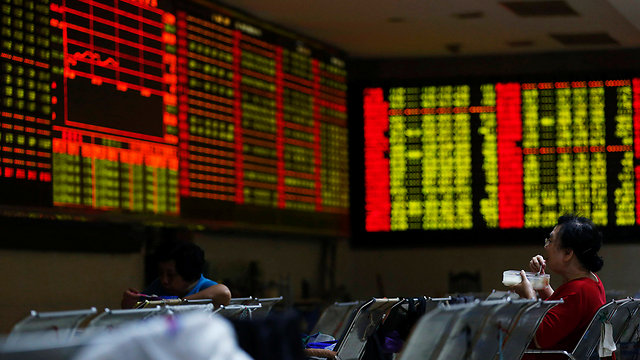
Bright Food headquarters in China. Tnuva acquisition evoked a major public protest
Photo: Billie Frenkel

Is the Chinese invasion good for Israel's economy?
While the growing Chinese investment in Israeli technology holds many advantages for the local economy, some Israelis warn of possible knowledge theft and others fear Israel will develop an economic dependence on a country which maintains warm relations with Iran.
The Calcalist business daily reported this week that huge Chinese investment company Shanghai Jiuchuan has purchased Israeli medical technology company SHL Telemedicine for $130 million.
Most Israelis know SHL as the operator of intensive care ambulances, which have even been given the generic name SHL due to the company's dominance in this field. But over the years it has expanded its activity and has become a company which provides monitoring and telediagnosis of heart and lung patients. In recent years, it has developed a technology which can turn a smartphone into a hospital-level electrocardiogram device.
Shanghai Jiuchuan is a private Chinese corporation which holds many public companies in China, mainly in the field of medical technology, as well as some 2,500 hospitals in the country.
Ongoing Cooperation
New agreement increases financing available to helping finance Israeli exports to China to $2.6 billion.
The Chinese corporation is interested in bringing the special technological ability developed by SHL to its country and marketing it to its billion residents. This isn't the first recent acquisition of an Israel medical company's innovative technology by a Chinese corporation. Last December, Chinese-owned SunPower acquired control over Natali, a smaller company than SHL, according to a company value of $70 million.
Photo: Reuters
The growing interest shown by Chinese companies in Israeli technology is often discussed. The most representative and complex case involved the richest Chinese person in the world, Li Ka-shing, who owns Hong Kong-based investment holding company Hutchison Whampoa, one of the largest corporation in the world. The foundation he established was one of the main beneficiaries of Google's acquisition of Waze last year, after it invested $30 million in the Israeli navigation application in 2011.
Shortly after the company was sold to Google, the money earned by Li found its way back to Israel when his foundation donated $130 million to the Technion – The Israel Institute of Technology in Haifa. The condition for the donation was that the Technion would establish a branch in China, where Israeli professors would train Chinese engineers.
Fear of patent theft
The Chinese investments in Israeli technology hold many advantages for the Israeli economy: They allow the development of products from the idea level to the finish and marketing levels, they create jobs in Israel and in some cases also enrich the state coffers. But there are people who are afraid of this phenomenon, as the Chinese have made a name for themselves as idea and technology thieves, who don't feel committed to copyrights and patent laws.The startup nation allegedly doesn’t have a more expensive resource than new ideas in the technological field, and there are those who fear that the growing involvement of Chinese companies in the local high-tech industry and in higher education will lead to the exploitation of the Jewish mind's finest ideas for China's economic benefit.
The fear of knowledge theft is only the tip of the iceberg of the Israeli concerns over the dramatic rise in the Chinese presence in the local economy. Since ChemChina bought 60% of Makhteshim Agan in 2011, Chinese companies have become very involved in all industries of the Israeli economy – from technology and medicine through industry and food to supervised and sensitive areas like finances and national infrastructures. The Israeli fear ranges, accordingly, from fear for the fate of Israeli patents to concerns over workplaces and geopolitical interests.
Some say the Israeli society is not doing enough to evaluate the chances and risks in these private companies' entry to the Israeli market. These fears, however, could be seen as an irrational phobia – after all, we are talking about mostly private companies which are driven by pure business motives.
The case which kicked off the debate over the Chinese involvement in the Israeli economy was Bright Food's decision to buy Apax Partners' stake in Tnuva. The deal in which the Chine corporation acquired 56% of the Israeli company's shares according to a company value of NIS 8.6 billion (about $2.3 billion) was completed in May. The acquisition evoked a major public protest, mainly because of Tnuva's position as one of Israel's leading food manufacturers.
The outcry led to a special discussion by the Knesset's Economy Committee, which called on the company to stop the sale. Addressing the deal, former Mossad chief Efraim Halevy stated: "Israel should beware a situation in which a foreign element controls a strategic asset like Tnuva, Israel's largest food company which supplies more than 60% of fresh dairy produce."
Warm diplomatic ties with Iran
Chinese companies, therefore, have already gained a significant foothold in the Israeli food market, in higher education and in the insurance industry, which coordinates most of the savings of the Israeli public. Now they are advancing to the field of national infrastructures, using the Israeli government's efforts to fight the cost of living.
Last March, Shanghai International Port Group won a bid to operate a new private port in the Haifa bay. In addition, Chinese construction companies are making many efforts to enter Israel's construction industry. Former Finance Minister and Chairman of the Housing Cabinet Yair Lapid held long talks with different Chinese companies in a bid to bring them to Israel. Israeli contractors strongly opposed these attempts, claiming that the Chinese arrival would sentence all their construction workers to unemployment.
At the same time, the government is making efforts to bring Chinese laborers to work for Israeli companies. These attempts have failed so far due to the Chinese government's demand that its citizens will only work within the Green Line.
The main fear over Chinese companies' growing involvement in the Israeli economy is the span of control they gain over the public's vital interests. Unlike American companies, which are backed by a government with a long history of cooperation with Israel and identification with its interests, China's stance on the issues Israel sees as important is not unequivocal. China maintains full diplomatic relations with Israel, but also has warm relations with Iran and other enemies of Israel.
While most of the Chinese companies invested in Israel are private, they operate with the approval and encouragement of the Chinese government. Is there a concern that they will one day take advantage of the influence that have gained over daily life in Israel in order to serve interests which contradict the Israeli interest? In addition, does a small economy like Israel even have the ability to oppose the entry of a powerful economic force like the capital China has accumulated in the past generation?
There doesn’t seem to be anyone on the Israeli government who is interested in dealing with this issue. Despite the public criticism, the government still views the economic relations with China solely as an opportunity to diversify Israel's trade relations and spread risks, while it's unclear where the next economic crisis will take place.
The Institute for National Security Studies (INSS) devoted an entire issue to this subject in April, calling on the government to thoroughly look into the matter. "This examination should begin immediately as part of a regular mechanism which will be established for this purpose, while addressing all the diplomatic, strategic, economic and technological aspects involved in China's activity in Israel and in the region," the INSS stated in the issue.
"This shouldn’t raise concerns that the actual examination will evoke resentment in China either. Such an examination is acceptable in different countries in the world which have economic relations with China – and China itself restricts certain foreign investments in its territory – and it is expected to ease the economic relations between China and Israel.
"It will make it possible to set clear measures for the approval of the activity of Chinese (and other) countries in Israel, locate the problematic cases and prevent a public debate regarding the activity of all other companies.
"Finally, it will prevent damage to the Israel-China relationship. The business sector in Israel acts faster than the government systems, and the Chinese corporations are learning the lessons of the past and improving their patterns of activity.
"The result is that as long as clear rules are not set regarding the activity of Chinese companies in Israel, future decision to change the moves that have been made and the facts have been established could claim a high price and seriously damage the relations between Israel and China."
















